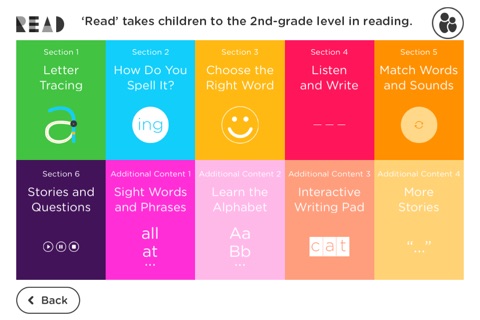
Read4Kids - Kids learn to read in 20 easy lessons app for iPhone and iPad
Developer: Olivier Romanetti
First release : 26 May 2016
App size: 33.01 Mb
Read is a 20-lesson program designed to help kindergarten and elementary school age children (4–8 age range) acquire reading skills in a fun and progressive way.
Read draws on two of the most popular methods currently in use for teaching to read in English: the PHONICS METHOD and the WHOLE LANGUAGE METHOD.
Most education experts now agree that a COMBINATION OF BOTH is the key to SUCCESSFUL LEARNING.
- Read is designed for optimal adaptability to the childs pace of learning
- Read uses natural-sounding voices in a variety of accents (American, British....).
- 20 lessons, 120 exercises, more than 150 interactives stories, step-by-step progression.
- No previous requirements: Read is aimed at children learning to read for the first time, and takes them to the 2nd-grade level in reading.
- The letters are introduced based on their frequency in the English language rather than their place in the alphabet. From lesson 1,
the child will be able to read short sentences then original stories that make sense, making for a truly rewarding reading experience.
- During the learning stage Read uses special symbols to help the child identify specific sound units or letter combinations.
- Reads colorful, simple yet appealing graphic design and kid-friendly interface help children get and stay focused.
- Read keeps track of the childs progress and fosters motivation through a fun and colorful achievement system.
- Read includes educational tips and detailed contextual help menus for parents and teachers.
ACTIVITIES
Letter Tracing
Using his finger, the child traces over the letters.
How Do You Spell It
The child listens to a sound then picks the correct answer among several written sound units.
Choose the Right Word
The child listens to a word then picks the correct answer among several written words.
Listen and Write
The child drags and drops sound units in order to write the word she has just heard.
The ability to construct a word from distinct building blocks is one of the fundamental skills required for fluent reading,
and a central component in the Phonics method.
Match Words and Sounds
The child matches a sound with its written form in a kind of auditory game of concentration.
This is especially effective for learning sight words, a pivotal element in the Whole Language method.
Interactive Writing Pad
This activity allows the child to construct words and sentences, or even invent made-up words—by freely drag-and-dropping individual letters (lower- or uppercase), letter combinations, and numbers to the interactive writing pad, which reads them aloud as she writes them.
Thats the magic of writing!
Stories and Questions
Stories range from a few words in the first lessons to fully-blown original narratives in the later stages.
Each story comes with a comprehension test consisting in one to three questions.
Making sure that your child fully understands what he has just read is essential: being a reader is not just about sounding out the written word but also of course getting the general meaning of a text.
Associating decoding and comprehension from the beginning encourages the child to pay close attention to and enjoy what hes reading.
Learn the Alphabet
This activity allows the child to learn or review the alphabet using both letter names and letter sounds, lowercase and uppercase letters.
More Stories
A collection of original or classic childrens stories that open up the world of reading for the child.
These stories, which are longer than those from the lessons, pave the way for the child to read her first books.
The child can touch any word to hear it pronounced.
She can also play the audio for the whole story while following the words on the screen.
Sight Words and Phrases
This activity familiarizes the child with over 100 sight words and sight phrases among the most frequently used in the English language.



